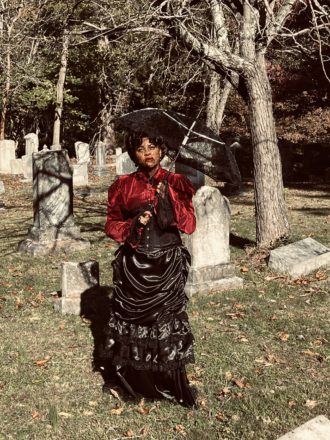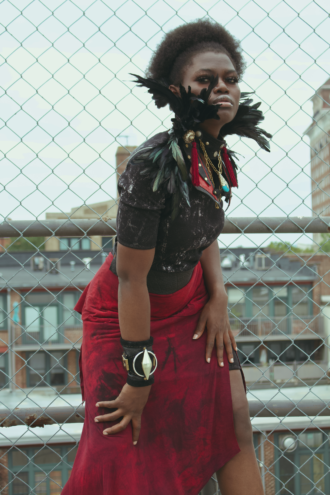Halloween has come and gone, but a look at Asheville’s costume shops suggests that area residents can always find an excuse to get dressed up. And just as clothing styles vary from person to person, so, too, do the approaches of local shop owners and designers. While some arrived to the industry by happenstance, others have spent decades developing their craft.
Maintaining traditions
The private Facebook group WAX – West Asheville Exchange is a valuable resource for selling a range of items, reuniting owners with lost pets and serving as a sounding board for neighborhood happenings. For Tawnya Watts, it also proved useful for buying a business.
Such was the case in 2017 when one of Watts’ friends saw a post advertising the sale of The Costume Shoppe. Susan Sertain, who’d owned the store for 15 years, was looking to sell it, and the friend immediately thought of Watts to purchase the storied establishment.
“It’s one of those old Asheville businesses,” says Watts.
Approaching 40 years, the shop has hopped around downtown with stints on Haywood Street, Lexington Avenue and Broadway. But today, it’s located at The Mills at Riverside in Woodfin.
Despite the nomadic existence — or perhaps because of it — The Costume Shoppe has maintained a steady customer base over the decades. Though people can purchase costumes, wigs, makeup, masks and other accessories, rentals comprise the bulk of Watts’ business.
“It’s a lot of regular folks who are just dressing up for various weirdo purposes of Asheville,” Watts says. “There’s always nonstop shenanigans in this area.”

At onset of the COVID-19 pandemic, Watts shifted to an appointment-only model and was kept financially afloat by creative, longtime renters who used the costumes for photo shoots or outdoor and drive-by events. Once regular operations resumed in 2021, business picked up and led to the best Halloween she’s had since owning The Costume Shoppe.
“Everyone was ready to get out of their homes,” she says.
The two-month Carolina Renaissance Festival in Huntersville also drove sales this October and November. Now Watts is gearing up for Christmas, one of the store’s busiest times each year as people rent Santa Claus, Grinch and elf outfits. Meanwhile, New Year’s Eve, the local Mardi Gras scene and Easter typically keep the shop busy through April. But once the Easter bunny leaves town, Watts says things calm down for a bit. The downtime allows her to focus on ordering, though finding quality textiles that can withstand the wear and tear of rentals has become more difficult.
“The Costume Shoppe has been in business so long that it’s outlasted some vendors. Some places where you could get certain things have gone away, and it can be tricky trying to figure out applying that kind of quality in the market now,” she says. “But some of my vendors are still family-owned businesses, so you can literally just call them up and talk to the cousin or their uncle and ask them specific questions about the costumes that you’re thinking about buying.” avl.mx/aul
Ethical ethos
Daniella Miller hadn’t thought about fashion much until heading off to college. Though she studied painting and therapy at the New School for Social Research in New York City, the Pennsylvania native often found herself in the company of fashion students from the nearby Parsons School of Design — and her mind started whirring.
“I’m from Pittsburgh, so, ecologically, things happened a lot quicker there from all the industry than they did in other places,” Miller says. “I was into ecology pretty hard, and the fashion industry was the second-largest polluter at the time. So I decided to use the skills that I already had … to practice an ecologically sustainable brand.”
Uninterested in the bustle of Manhattan, Miller left school and started Royal Peasantry in Cleveland in 1999. She then moved around before landing in Asheville in 2007. Over those 20-plus years, Royal Peasantry has stood apart from many fashion enterprises for its ethical practices, as well as other creative and humanist approaches.
“We make our own inventory, and that means every piece is going to be different, no matter what,” Miller says. “And we definitely spend four times our rent on labor and fair wages, so that’s different.”
Miller feels an overreliance on hashtags and descriptors have limited artists’ imaginations. Any real designer, she maintains, should be known by their name and personal style, and she’s quick to note patterns that have arisen in her work.

“It’s pretty fantastical. We definitely do fantasy stuff and things that people always imagined but never knew where to find,” Miller says. “When you use upcycled materials, they’re from anywhere from the turn of the century all the way to yesterday, manufactured in China. The materials lend all the different timelines, blended together, and gives it a special quality.”
In addition to its purchasable offerings, Royal Peasantry has a robust rental side, outfitting people with capes, wings, headdresses, gators, gowns and more. But when the pandemic hit and dress-up events were canceled, Miller and her colleagues pivoted, making everything from wallets to larger pieces that they knew collectors would want to buy.
“We made some amazing costumes — full-body harnesses that looked like Viking princess meets She-Ra,” Miller says with a laugh. “Very wild stuff, but every one was bought. Just knowing our market and having a supportive customer base that didn’t want to see us go down or worry too much was really nice.” avl.mx/aum
Renewed passion
The seeds of Organic Armor date back to the 1990s when Paul Hersey began making costumes and props using a combination of latex rubber, fiber and acrylic for a core audience of Burning Man attendees. From there, the then-Los Angeles resident started selling his work at festivals along the West Coast that catered to that same crowd, and it was a huge hit.
“Organic Armor was highly appreciated on the playa because it’s lightweight, easy to clean and is original art,” Hersey says. “It was enough to let me quit my day job as a mainframe programmer.”
The company officially launched in Asheville in 2007, and the addition of a website and social media presence soon attracted cosplayers, belly dancers and Renaissance fair attendees, leading to steady commission work. Photographers’ interest in shooting Hersey’s costume pieces led to stunning imagery and a global reputation, and in 2014 the mermaid/merman contingency from around the world flocked to Organic Armor for its elegant, lightweight, comfortable nature and ability to be worn in water.
Regardless of a costume’s theme, nearly all customers wanted to know how Hersey and his wife, Jennifer Murphy, made their work.
“At first I didn’t want to share the process. I was worried someone would rip off our designs. But after about eight years I realized no one could do it like I do — no one else would have the patience,” Hersey says. “And the materials are so versatile, I felt like I should share it because other artists could take it in new directions that I would never think of or have time to do.”
Ultimately, Hersey launched an online course, distilling the methods into easy steps that have attracted students as young as 6. Hersey says he’s amazed and thrilled with the work that is made from the core materials, which he stresses aren’t expensive, dangerous or toxic.
But at the end of 2018, Hersey was in an accident that forced him to stop everything — including the long hours of work that, over the course of many years, had made him feel burned out. Once recovered, he had a hard time getting back into that grind and soon developed additional health problems that came with prescribed medication that left him perpetually tired.
Studio work was nearly impossible, and though he and Murphy continued to teach workshops until the pandemic hit, he turned down all commissions. Then in late summer of this year, an old friend showed up at his house, excited about a Halloween costume he wanted for a trip to Las Vegas.
“He was so lit up and energized that it kind of rubbed off on me. It was a fairly simple unicorn headdress that I felt was doable in the time frame, so I surprised everyone by saying, ‘Yes,’” Hersey says. “I had fun with it, and in the process cleaned up and organized my workspace. Now I’m figuring out what’s next. I don’t have to make it financially to support my family anymore, so it’s kind of like it was at the very beginning again. Just me making stuff I want to see.” avl.mx/aun




Before you comment
The comments section is here to provide a platform for civil dialogue on the issues we face together as a local community. Xpress is committed to offering this platform for all voices, but when the tone of the discussion gets nasty or strays off topic, we believe many people choose not to participate. Xpress editors are determined to moderate comments to ensure a constructive interchange is maintained. All comments judged not to be in keeping with the spirit of civil discourse will be removed and repeat violators will be banned. See here for our terms of service. Thank you for being part of this effort to promote respectful discussion.